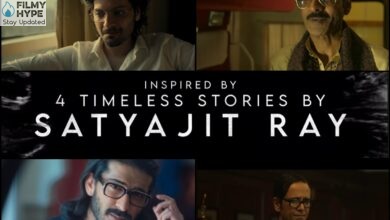Shantaram Review: Apple Has Once Again Gone In Search Of A Series With A Great Breath
Cast: Charlie Hunnam, Antonia Desplat, Alexander Siddig
Creator: Eric Warren Singer, Steve Lightfoot
Streaming Platform: Apple Tv+
Filmyhype.com Ratings: 3/5 (three stars)
Shantaram Review: After being courted for almost twenty years by the big screen (Johnny Depp and Peter Weir among others have tried to make a film, developing creative disagreements that have practically led to the withdrawal of the great Australian author) the book-truth published by Gregory David Roberts instead, it arrives on the Apple Tv+ streaming platform in the form of a miniseries. The story tells in Shantaram it is precisely that of the real robber and drug addict Lindsey (fake name of the same writer) who, after being sentenced to nineteen years in prison, in 1980 manages to escape from an Australian prison and escape to India, where a path of redemption and spiritual rebirth begins.

Between the end of the 90s and the beginning of the 2000s, the West was experiencing a great love story, so much so that it married off with globalization. A marriage contract where all the positive aspects of this incredible novelty were listed: breaking down of geographical boundaries, cultural mixing, travel, widespread economy, and well-being of all peoples. It all seemed like a great positivist daydream. In the same marriage contract, at the bottom and very small, one could read a further note: the West and the Westerners must remain at the center of history. It is therefore not strange that in 2003 Shantaram, the semi-autobiographical novel by Gregory David Roberts, a man with an objectively incredible life, immediately became a huge literary case. So much so that Hollywood, in this case, Warner immediately opted for the rights of the work for a film adaptation. The project initially involved the script Eric Roth, in the title role of Johnny Depp (at the height of his popularity) and direct, after a first step back by Peter Weir, the Indian director Mira Nair.
Shantaram Review: The Story
Shantaram is first and foremost the story of a journey, perhaps the definitive journey – understood as a parallel itinerary between soul and body, internal and external. The first episode opens with an enlightening statement by the protagonist Dale Conti, a heroin addict locked up in prison after a bank theft, on the nature of the path that awaits him outside, on what he will have to learn to be in the world. From behind bars, Dale dreams of the freedom to rediscover himself, face the mistakes of the past, and start over. To achieve this, he chooses to escape from prison.
Dale reaches Bombay with a false passport and another identity: Lindsey’s, known as Lin. A new beginning, far from the violence of prison. Except that, in a second, Dale-Lin is catapulted into the international underworld circuit of Bombay. Wandering through the streets of the city, he discovers a bar where some of the most unique personalities of the district gather. Among these, there is also Karla, a persuasive and mysterious figure to whom Lin feels an immediate attraction. But the woman dabbles in shady and disreputable activities, and the protagonist soon becomes embroiled in the criminal circle of the city.
It is a story played entirely on the ambivalence of the content. Shantaram, on paper, is a simple and direct TV drama, built on a model suitable for audiences who are passionate about thrillers and crime. But the character dimension of the story seems to direct the series towards wider horizons. The gender assumption represents for Dale/Lin an opportunity to redeem himself, to experience an existence different from the one that his past choices seemed to prefix. What begins as a simple prison drama, then, soon reveals itself for what it is: a story of redemption.
Shantaram Review and Analysis
This repetitive path to redemption sees Lin saving others in an attempt to save himself. Consequently, the need for help from a people and culture, described with an ancient exotic characterization, by the western foreigner, is stressed several times. An approach in which he struggles not to notice an inappropriate mentality. Attention, we do not want to accuse the series of offensive behavior, or a reactionary and colonialist approach. Simply Shantaram still embraces a sensitivity close to that of the early 2000s mentioned in the introduction of this review.
An innate matrix that however sees the white Westerner approaching a distant culture with a sense of superiority, with the conviction of his saving and innovative role within history. A sensitivity that is no longer current, which can make today’s viewer turn up their noses, who now know the state of things well and who probably empathizes more with Prabhu, the true heart of the series, rather than with the protagonist. This out of date is even more surprising when you consider that Shantaram should be a postcard of Apple’s approach to international projects.
Beyond the question linked to an out-of-time approach, however, Shantaram cannot be considered an insufficient series. The production values put in place are important and the packaging of the product (as always when it comes to Apple) is of an excellent level, starting from the interpretations. Charlie Hunnam is perhaps far too charismatic and handsome for the character of Lin but we certainly can’t blame him for that. His work on this innate suffering and the constant decision-making doubts is excellent, especially the one done on the look. With Lin, Hunnam, as much as he denied it in a recent interview, found a character capable of recalling the complexities and physicality of Sons of Anarchy’s Jax. The rest of the cast is also well assembled and, in addition to Shubham Saraf in the role of Prabhu and the usual great Alexander Siddig in that of Khader Khan, we want to mention the splendid Elektra Kilbey, magnetic in the role of Lisa. Even on a technical level, things work well, with good direction and photography that repeatedly recalls the great classics of adventure films. The editing is sometimes too frenetic but not so much as to create insurmountable problems.
The discourse relating to the narration is different. The problem lies not so much in the repetitiveness of Lin’s arc, but rather in a story that is too dense and full of characters and subplots. A quantity of micro-arcs and names can create confusion in the viewer and that above all fragment the rhythm and the narration. This is at least until the last three episodes which instead find a good cohesion and manage to create the right hook for the continuation of the story in a possible second season. However, Shantaram, in this density and richness of variety that is very similar to Bombay itself, can offer something interesting to every type of spectator. Ultimately, we can say that we are facing a great series rather than a great series.
Ultimately, it is precisely this loyalty to the crime system that flattens the final result. In choosing the angle of the story, Singer and Lightfoot have very clear ideas and maintain a compact and coherent tone for all three episodes. But their stylistic code turns out to be too rigid to support the innumerable nuances of the original novel. Consequently, within the “genre” format, the more strictly dramatic components of the story (love, betrayal, friendship) end up seeming out of place, unpaired, and artificial.
An example above all: the protagonist’s intrusive voice-over, which accompanies the first episodes with a series of didactic and substantially irrelevant comments, betrays limited confidence in the dramaturgical potential of the series. It does not help, then, fidelity to the canons of the genre that borders on mannerism: the figures linked to the criminal Bombay have around them an aura of sad predictability as if their value was not inherent in the character itself, but in the role that they must cover in the narrative scheme. And Charlie Hunnam, while willingly lending himself to the part of Lin, is unable to find an interpretative perspective that makes the protagonist’s drama true and current.
All of this heavily affects the overall impact of the series, which goes from captivating to obvious within a few sequences. Even the setting ends up looking fake, almost a circumstantial element, a container to be stimulated, and not stimulating. Shantaram, in this way, violently flattens the thematic inspiration of the novel. It had to be a crime with a spiritual air, of human depth, expanded beyond the boundaries of the reference genre. From what emerges in the first three episodes, however, Shantaram confines himself to his most basic setting, never really breathing as he would like. The next episodes will give us a more precise idea of the final destination, but what lies ahead is a simpler and more banal journey than might have been expected.
Shantaram Review: The Last Words
With Shantaram, Apple has once again gone in search of a series with the great breath, able to collect and convey the interest of millions of viewers. On a technical level, as always when it comes to this platform, we are faced with an excellent product. However, due to an antiquated sensitivity and a too dense and fragmented story, the impression is that of being in front of a great series rather than a great series.







